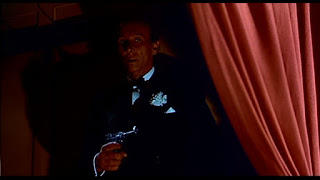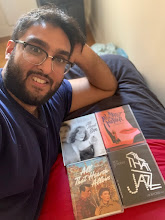Rogue Nation explicitly references two classic Hitchcock thrillers: North by Northwest and The Man Who Knew Too Much. But the film on the whole is a general "wrong man" thriller homage about a guy on the run from his own government and is out to prove himself right. While most people generally think of James Bond 007 as the major influence of modern spy thrillers, Rogue Nation goes to the Hitchcock template for suspense building.
I'm not the first one to point out that the Vienna Opera House scene is a direct homage to the wonderful scene where there is an assassination plot directly timed to a precise note of music. Both scenes (actually all three since TMWKTM comes in two forms, 1934 and 1956) are near wordless, letting visual filmmaking outline the story, and the scenes all use non-traditional music to build suspense and action beats.
I did some research about the opera where Ethan Hunt (Tom Cruise) and Benji (Simon Pegg) stumble onto an assassination plot while searching for leads to the Syndicate. The opera is Turandot by Giacomo Puccini. The plot concerns Prince Calaf who falls in love with Princess Turandot. To woo her he must solve three riddles. If he answers wrong to any riddle, he dies. But Calaf passes the test and yet the princess refuses to marry him. He promises that if she finds out his name by daybreak, he will die.
So let's see why Turandot was chosen as the showcase opera for this scene. After this opera scene, there are three main action scenes: the underwater turbine tank, the car/motorcycle chase and the main climax. Perhaps these are the three "riddles" Hunt has to pass in the film? In all three, he (and Cruise himself who did his own stunts) barely escape death. Perhaps, the three riddles are referring to the the various double crosses and triple crosses that Ethan must wade through in order to complete his mission. And the theme of identity being linked to death is clear throughout the Mission: Impossible series. It may be a coincidence that writer/director Christopher McQuarrie (Jack Reacher) chose Turandot for his opera scene but it seems unlikely.
Going back to Hitchcock, McQuarrie builds on Hitchcock's premise by adding in a few more obstacles in Ethan's way (another reference to riddles), including two more henchmen other than the assassin and also the mysterious woman holding the gun (Ilsa Faust, played by Rebecca Ferguson). Also, Ethan and Benji aren't explicitly there to stop the assassination; they stumble on it. By placing this sequence earlier in the film (though it could be its own climax), McQuarrie is layering on suspense and intrigue and the Opera house sequence is amazingly thrilling.
North by Northwest (with a touch of Notorious**)
A lot of praise for this movie is being piled onto Rebecca Ferguson's portrayal of Ilsa Faust. The character is fascinating, as her true loyalties are always in question. That reminded me of Eve Kendall (Eva Marie Saint) in North by Northwest. Kendall is a double agent, who has to put on different performances in front of different people sometimes at the same time. Eve is also the lone female major character in her spy story.
Ilsa Faust also goes through the movie, doing things for the villains while silently indicating who's she's really working for. The script features multiple double crosses, and it's hard to parse through them to figure out where true alliances are. Like Eve Kendall, Faust is being used by all sides and struggles to find her own ways to do what's right for her. Faust and Kendall add some emotional complexity to these outlandish spy plots.
I bring up Notorious because that film juxtaposed the American government (nominally the good guys) with the Nazi spies. In some ways, the American government were a lot crueler and unfeeling as the Nazis. In fact, one could argue that Alexander Sebastian (Claude Rains), the Nazi that Alicia Huberman (Ingrid Bergman) is forced by the Americans to marry so she can spy on him, is the most sympathetic character in the film. The American agent tasked to be her handler Devlin (Cary Grant) is mean and punishing towards Huberman for the very mission he put her on.
In Rogue Nation, while the villains certainly aren't teddy bears, the American and British governments are equally cruel and petty. They only care about the mission and not about what they are putting their agents through. This distrust of the government is pure Hitchcock. He had a general fear of the police and the government, and that theme runs through his films with menacing or sometimes incompetent policemen. In Rogue Nation, Faust says that the villains and heroes are the same, it's just that she and Hunt believe what the "heroes" are saying. It's not hard to imagine Eve Kendall or Alicia Huberman thinking the same thing.
Mission: Impossible-Rogue Nation references Alfred Hitchcock through its plot machinations. By introducing Ilsa Faust, who I hope returns in the upcoming MI:6, adds some moral complexity to the movie. Christopher McQuarrie adds in some old school suspense (and not just superficial thrills) making Rogue Nation one of the best blockbusters of summer 2015.
**I've heard around that Mission: Impossible II is a more direct homage to Notorious but I can't confirm that because I've no memory of that film.
Like what you read? Please like my blog at Facebook.com/MathurMarquee. Also, follow me on Twitter @HippogriffRider. For more of my work, check out Horror Film Central. Agree? Disagree? Sound off in the comments below!
Ilsa Faust also goes through the movie, doing things for the villains while silently indicating who's she's really working for. The script features multiple double crosses, and it's hard to parse through them to figure out where true alliances are. Like Eve Kendall, Faust is being used by all sides and struggles to find her own ways to do what's right for her. Faust and Kendall add some emotional complexity to these outlandish spy plots.
I bring up Notorious because that film juxtaposed the American government (nominally the good guys) with the Nazi spies. In some ways, the American government were a lot crueler and unfeeling as the Nazis. In fact, one could argue that Alexander Sebastian (Claude Rains), the Nazi that Alicia Huberman (Ingrid Bergman) is forced by the Americans to marry so she can spy on him, is the most sympathetic character in the film. The American agent tasked to be her handler Devlin (Cary Grant) is mean and punishing towards Huberman for the very mission he put her on.
 |
| The CIA |
Mission: Impossible-Rogue Nation references Alfred Hitchcock through its plot machinations. By introducing Ilsa Faust, who I hope returns in the upcoming MI:6, adds some moral complexity to the movie. Christopher McQuarrie adds in some old school suspense (and not just superficial thrills) making Rogue Nation one of the best blockbusters of summer 2015.
**I've heard around that Mission: Impossible II is a more direct homage to Notorious but I can't confirm that because I've no memory of that film.
Like what you read? Please like my blog at Facebook.com/MathurMarquee. Also, follow me on Twitter @HippogriffRider. For more of my work, check out Horror Film Central. Agree? Disagree? Sound off in the comments below!






No comments:
Post a Comment